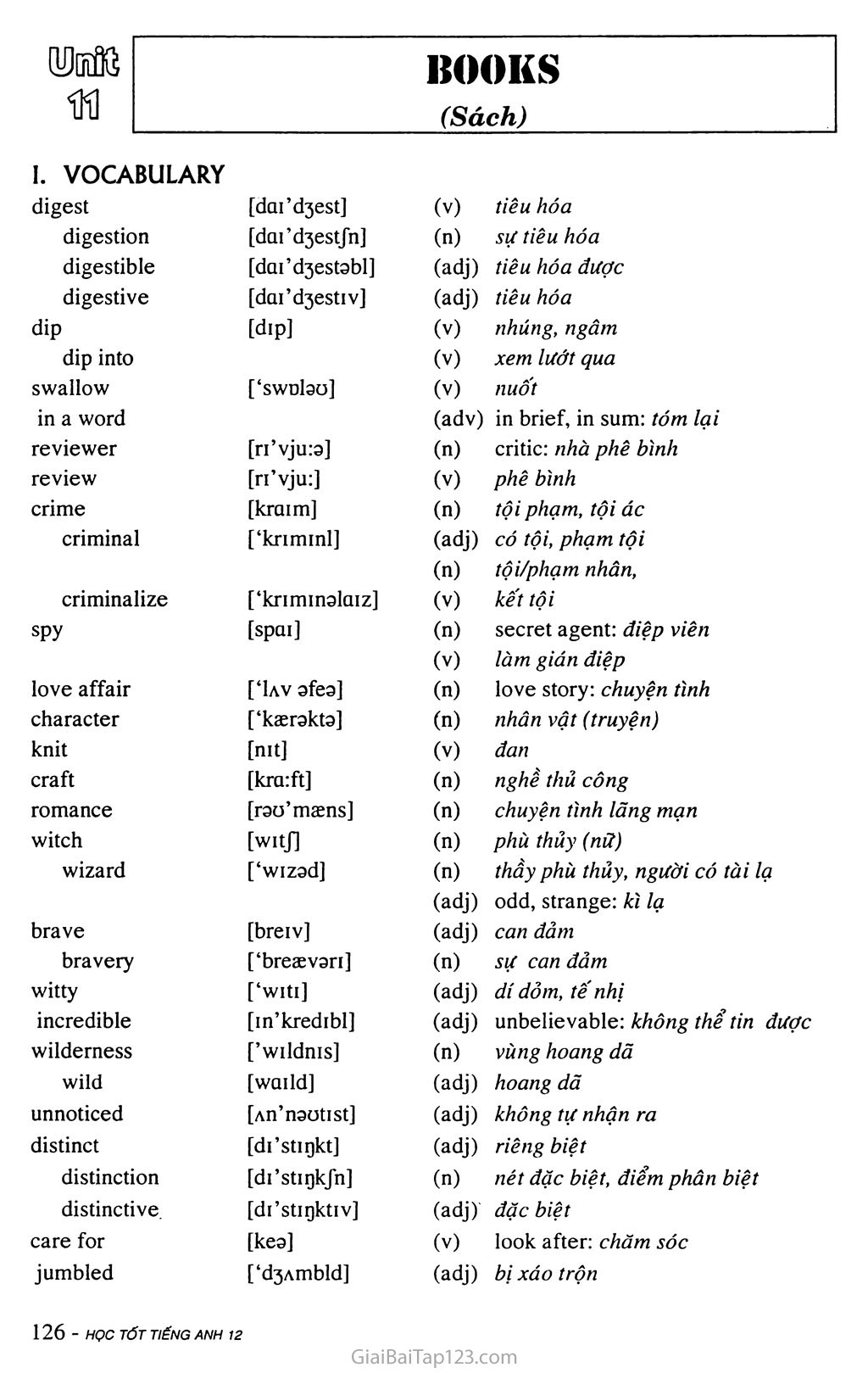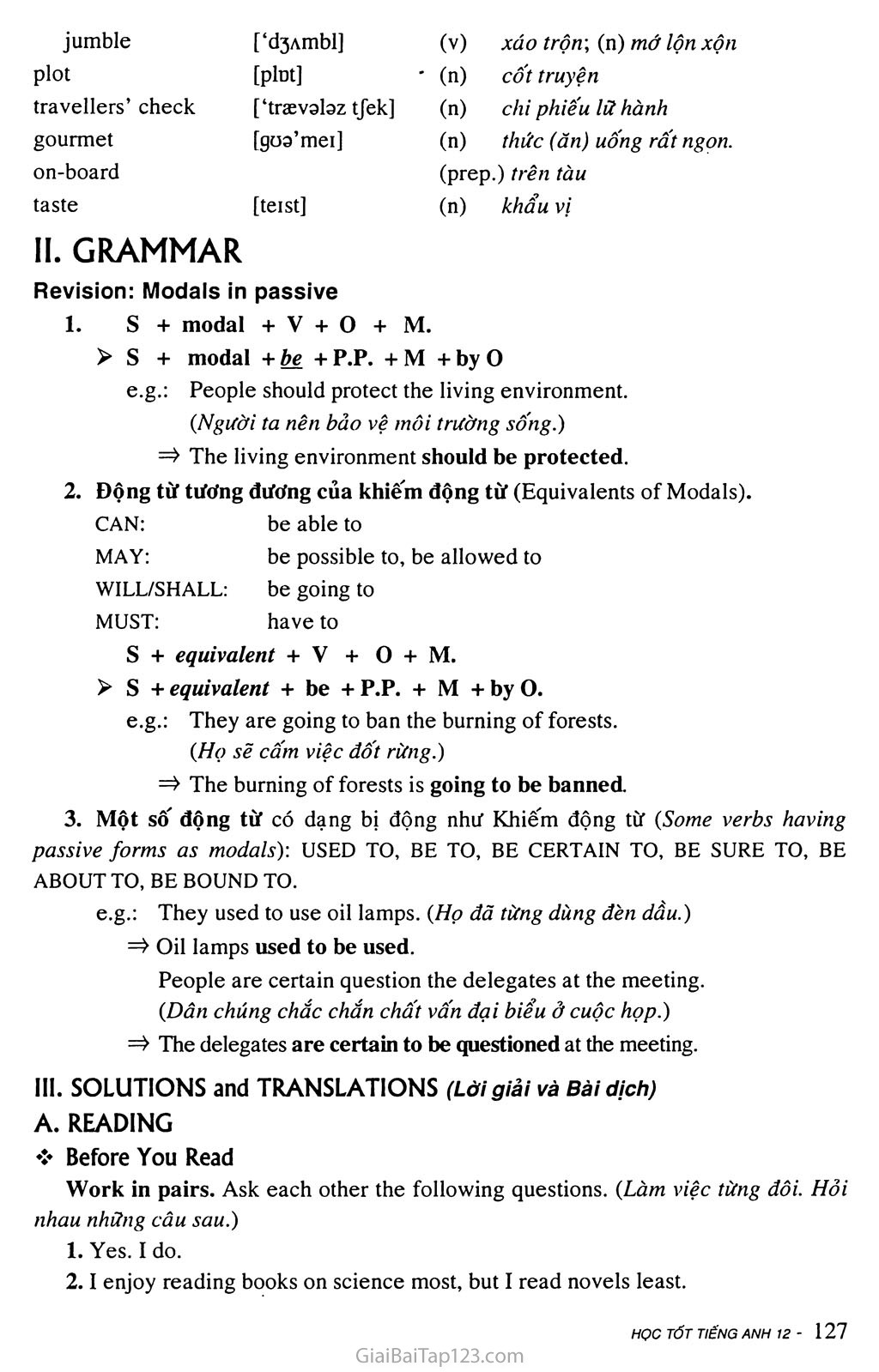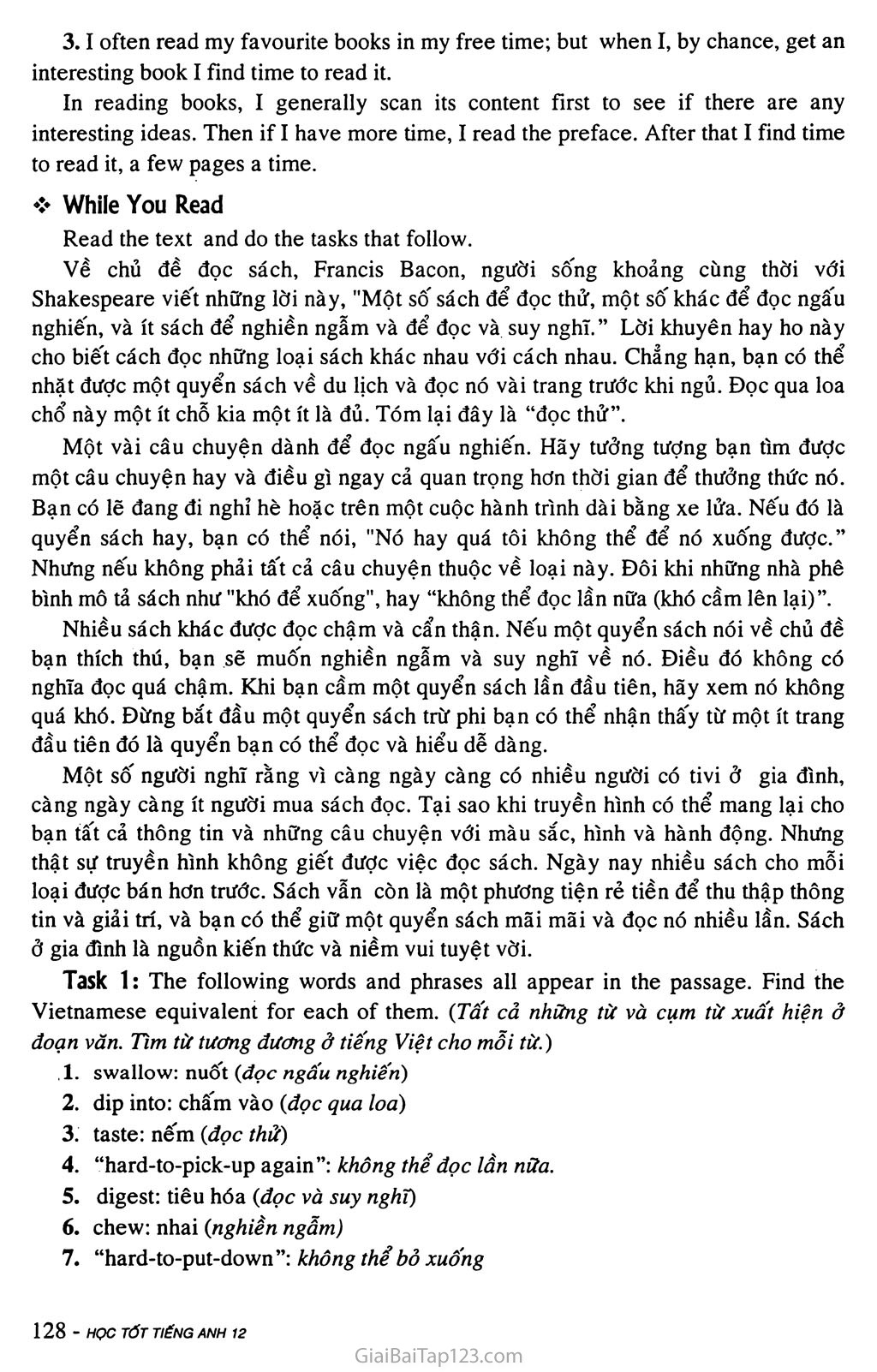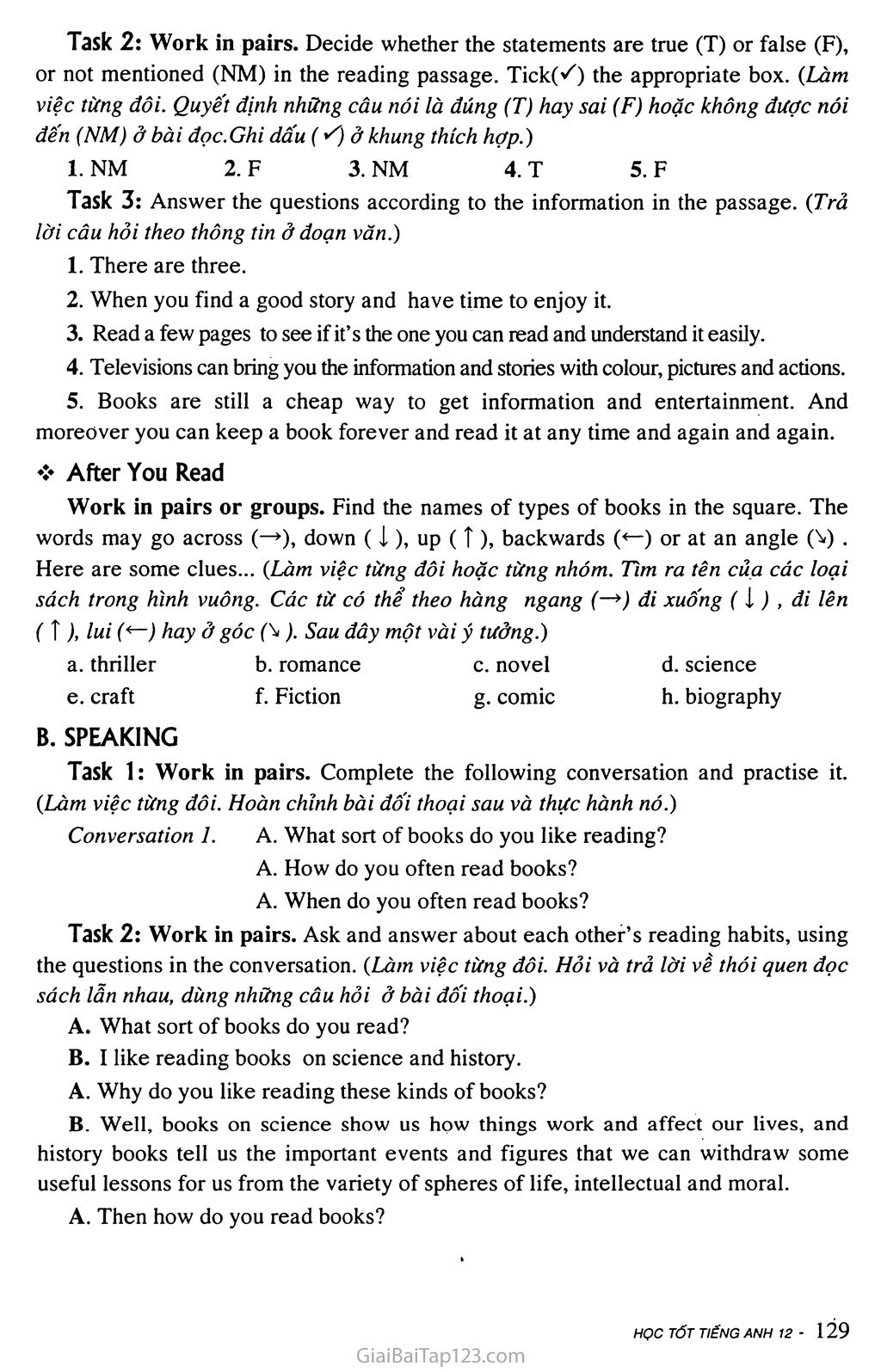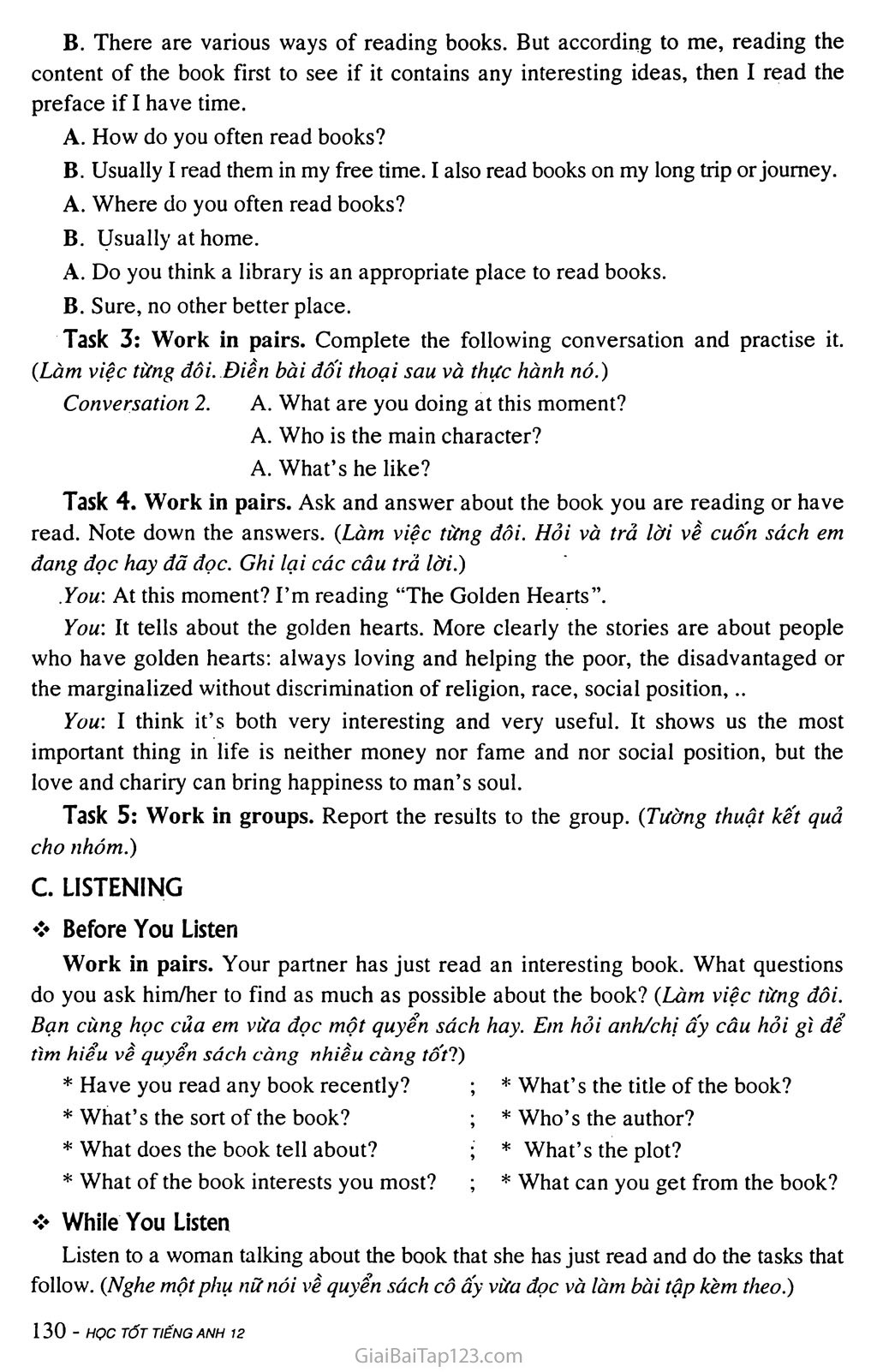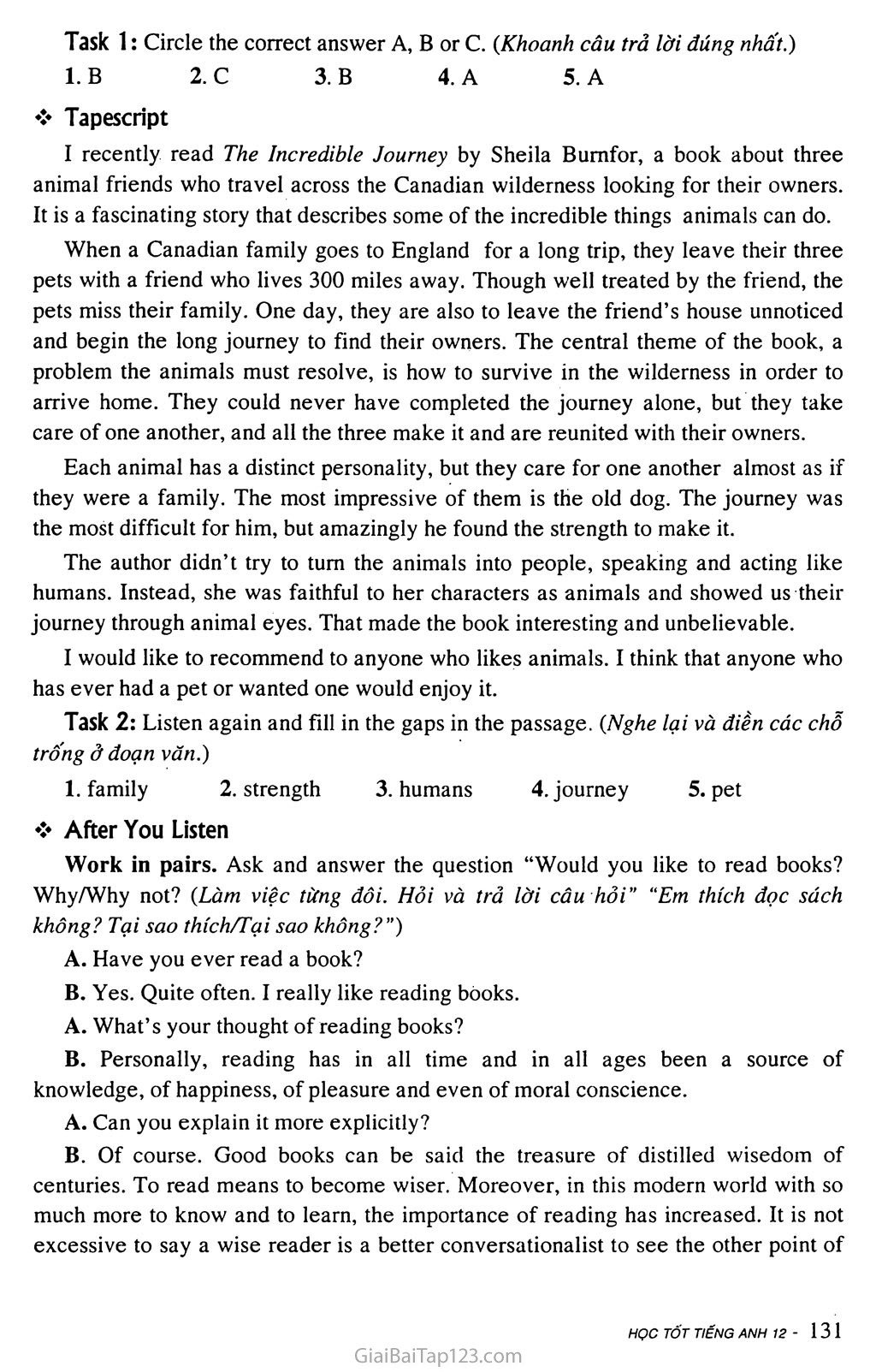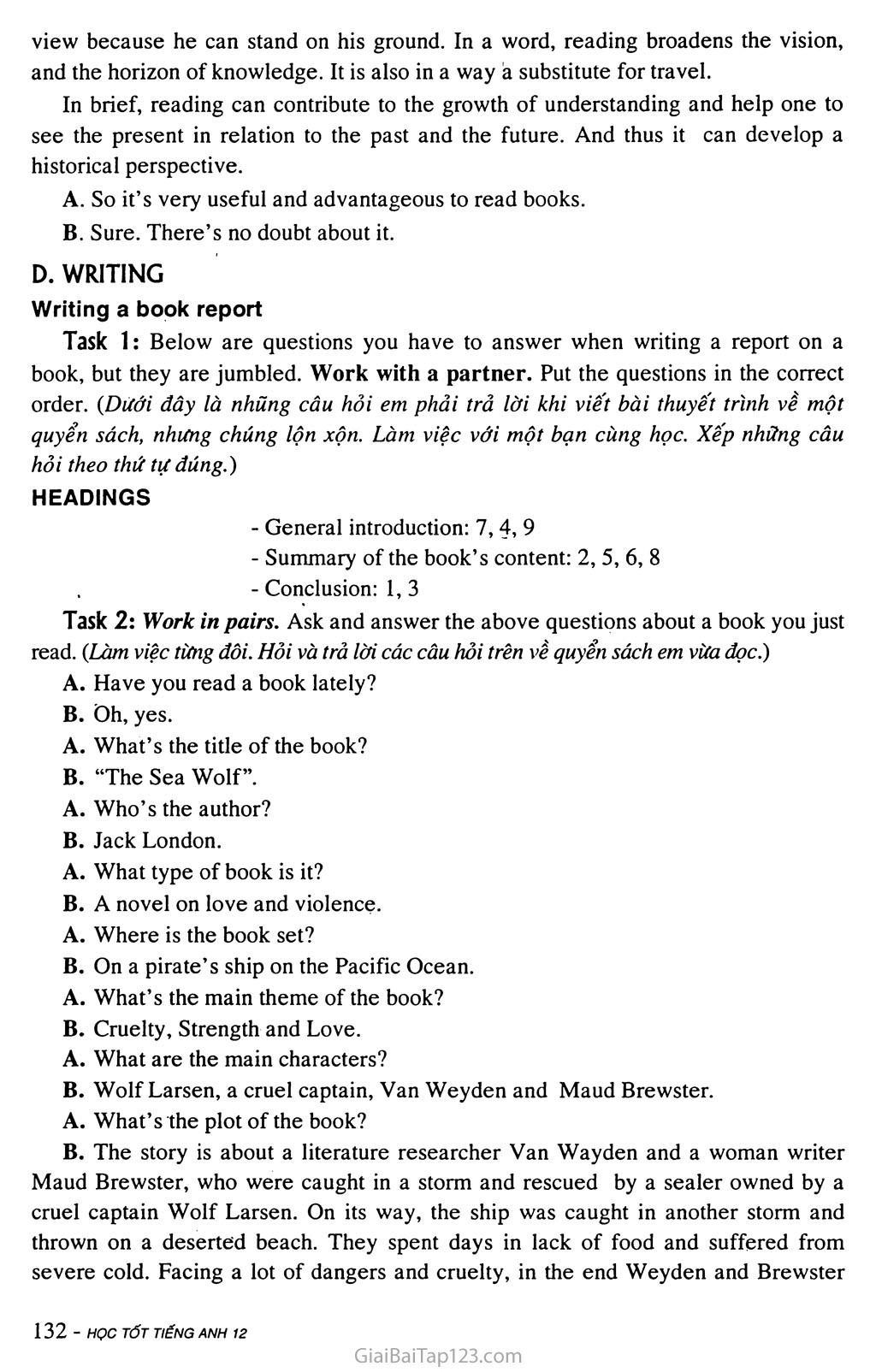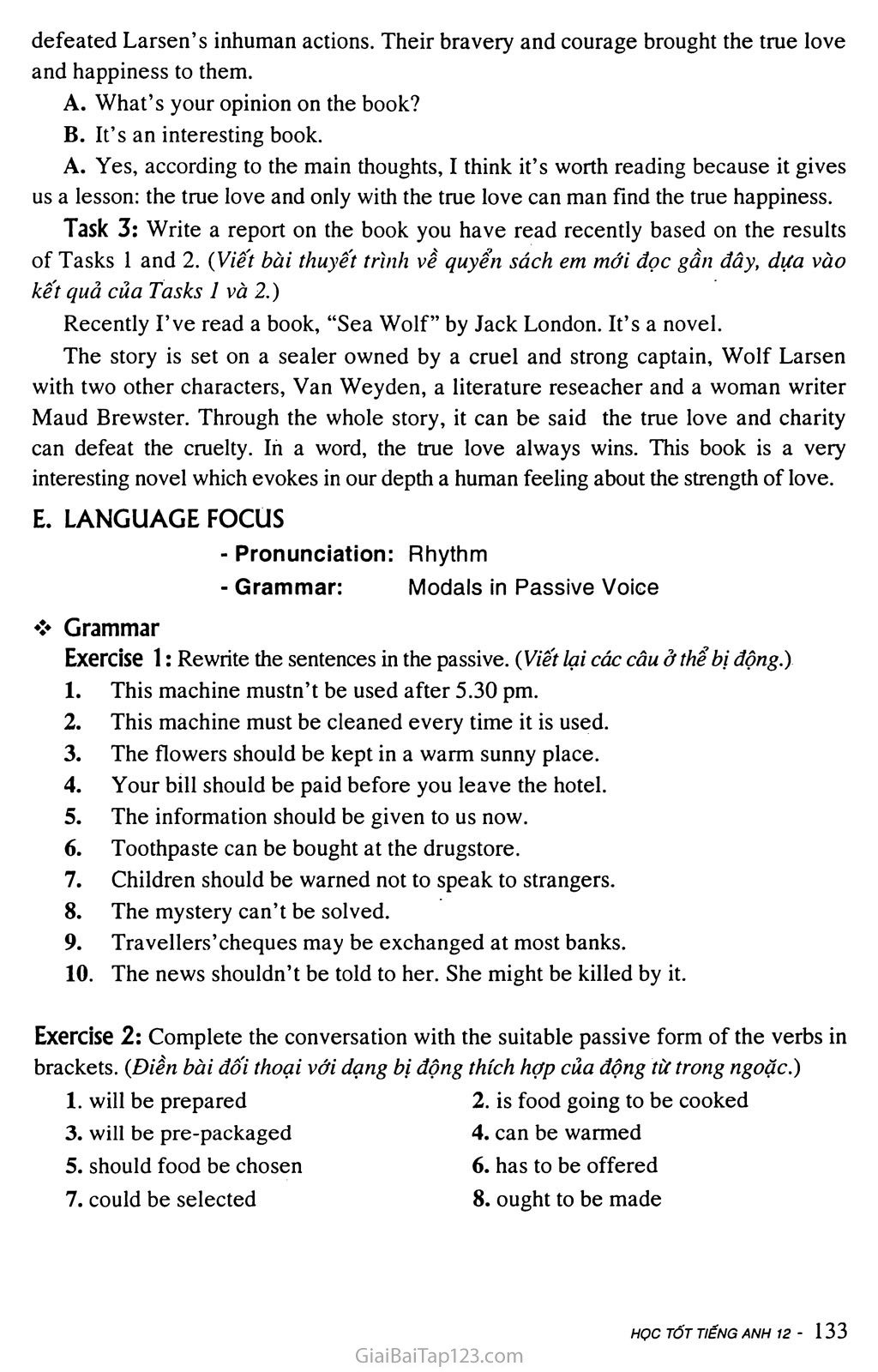Giải tiếng Anh lớp 12 Unit 11: BOOKS
BOOKS
(Sách)
I. VOCABULARY
digest
[dai’dyest]
(V)
tiêu hóa
digestion
[dai’d3estjn]
(n)
sự tiêu hóa
digestible
[dai’d3establ]
(adj)
tiêu hóa được
digestive
[dai’d3estiv]
(adj)
tiêu hóa
dip
[dip]
(V)
nhúng, ngâm
dip into
(V)
xem lướt qua
swallow
[‘swDlao]
(V)
nuốt
in a word
(adv) in brief, in sum: tóm lại
reviewer
[ri’vju:a]
(n)
critic: nhà phê bình
review
[ri’vju:]
(V)
phê bình
crime
[kraim]
(n)
tội phạm, tội ác
criminal
[‘kriminl]
(adj)
(n)
có tội, phạm tội tội/phạm nhân,
criminalize
[‘kriminalaiz]
(V)
kết tội
spy
[spai]
(n)
secret agent: điệp viên
(V)
làm gián điệp
love affair
[‘Iav afea]
(n)
love story: chuyện tình
character
[‘kasrakta]
(n)
nhân vật (truyện)
knit
[mt]
(V)
đan
craft
[kra:ft]
(n)
nghề thủ công
romance
[rao’miens]
(n)
chuyện tình lãng mạn
witch
[witfl
(n)
phù thủy (nữ)
wizard
[‘wizad]
(n)
(adj)
thầy phù thủy, người có tài lạ odd, strange: kì lạ
brave
[breiv]
(adj)
can đảm
bravery
[‘bresevari]
(n)
sự can đảm
witty
[‘win]
(adj)
dí dỏm, tế nhị
incredible
[in’kredibl]
(adj)
unbelievable: không thể tin được
wilderness
[’wildms]
(n)
vùng hoang dã
wild
[waild]
(adj)
hoang dã
unnoticed
[An’naotist]
(adj)
không tự nhận ra
distinct
[di’stirjkt]
(adj)
riêng biệt
distinction
[di’stigkfn]
(n)
nét đặc biệt, điểm phân biệt
distinctive.
[di’stirjktiv]
(adj)
đặc biệt
care for
[kea]
(V)
look after: chăm sóc
jumbled
[ld3Ambld]
(adj)
bị xáo trộn
jumble
f‘d3Ambl]
(V)
xáo trộn; (n) mớ lộn xộn
plot
[plot]
' (n)
cốt truyện
travellers’ check
[‘trasvoloz tjek]
(n)
chi phiếu lữ hành
gourmet
[goa’mei]
(n)
thức (ăn) uống rất ngon.
on-board
(prep.) trên tàu
taste
[teist]
(n)
khẩu vị
GRAMMAR
Revision: Modals in passive
s + modal + V + o + M.
s + modal + be + p.p. + M + by o
e.g.: People should protect the living environment.
{Người ta nên bảo vệ môi trường sống.)
=> The living environment should be protected.
Động từ tương đương của khiếm động từ (Equivalents of Modals).
CAN: be able to
MAY: be possible to, be allowed to
WILL/SHALL: be going to
MUST: have to
s + equivalent + V + o + M.
s + equivalent + be + p.p. + M + by o.
e.g.: They are going to ban the burning of forests.
{Họ sẽ cấm việc đốt rừng.)
=> The burning of forests is going to be banned.
Một số’ động từ có dạng bị động như Khiếm động từ {Some verbs having passive forms as modals): USED TO, BE TO, BE CERTAIN TO, BE SURE TO, BE ABOUT TO, BE BOUND TO.
e.g.: They used to use oil lamps. {Họ đã từng dùng đèn dầu.)
=4 Oil lamps used to be used.
People are certain question the delegates at the meeting.
{Dân chúng chắc chắn chất vấn đại biểu ở cuộc họp.)
=$ The delegates are certain to be questioned at the meeting.
SOLUTIONS and TRANSLATIONS (Lời giải và Bài dịch)
Á. READING
❖ Before You Read
Work in pairs. Ask each other the following questions. (Làm việc từng dôi. Hỏi nhau những câu sau.)
1. Yes. I do.
2.1 enjoy reading books on science most, but I read novels least.
3.1 often read my favourite books in my free time; but when I, by chance, get an interesting book I find time to read it.
In reading books, I generally scan its content first to see if there are any interesting ideas. Then if I have more time, I read the preface. After that I find time to read it, a few pages a time.
❖ While You Read
Read the text and do the tasks that follow.
về chủ đề đọc sách, Francis Bacon, người sông khoảng cùng thời với Shakespeare viết những lời này, "Một số’ sách để đọc thử, một số khác để đọc ngấu nghiên, và ít sách để nghiền ngẫm và để đọc và suy nghĩ.” Lời khuyên hay ho này cho biết cách đọc những loại sách khác nhau với cách nhau. Chẳng hạn, bạn có thể nhặt được một quyển sách về du lịch và đọc nó vài trang trước khi ngủ. Đọc qua loa chổ này một ít chỗ kia một ít là đủ. Tóm lại đây là “đọc thử”.
Một vài câu chuyện dành để đọc ngấu nghiến. Hãy tưởng tượng bạn tìm được một câu chuyện hay và điều gì ngay cả quan trọng hơn thời gian để thưởng thức nó. Bạn có lẽ đang đi nghỉ hè hoặc trên một cuộc hành trình dài bằng xe lửa. Nếu đó là quyển sách hay, bạn có thể nói, "Nó hay quá tôi không thể để nó xuống được.” Nhưng nếu không phải tât cả câu chuyện thuộc về loại này. Đôi khi những nhà phê bình mô tả sách như "khó để xuống", hay “không thể đọc lần nữa (khó cầm lên lại)”.
Nhiều sách khác được đọc chậm và cẩn thận. Nếu một quyển sách nói về chủ đề bạn thích thú, bạn sẽ muôn nghiền ngẫm và suy nghĩ về nó. Điều đó không có nghĩa đọc quá chậm. Khi bạn cầm một quyển sách lần đầu tiên, hãy xem nó không quá khó. Đừng bắt đầu một quyển sách trừ phi bạn có thể nhận thây từ một ít trang đầu tiên đó là quyển bạn có thể đọc và hiểu dễ dàng.
Một số’ người nghĩ rằng vì càng ngày càng có nhiều người có tivi ở gia đình, càng ngày càng ít người mua sách đọc. Tại sao khi truyền hình có thể mang lại cho bạn tất cả thông tin và những câu chuyện với màu sắc, hình và hành động. Nhưng thật sự truyền hình không giết được việc đọc sách. Ngày nay nhiều sách cho mỗi loại được bán hơn trước. Sách vẫn còn là một phương tiện rẻ tiền để thu thập thông tin và giải trí, và bạn có thể giữ một quyển sách mãi mãi và đọc nó nhiều lần. Sách ở gia đình là nguồn kiến thức và niềm vui tuyệt vời.
Task 1: The following words and phrases all appear in the passage. Find the Vietnamese equivalent for each of them. {Tất cả những từ và cụm từ xuất hiện ở đoạn văn. Tìm từ tương đương ở tiếng Việt cho mỗi từ.)
swallow: nuốt {đọc ngấu nghiến)
dip into: chấm vào {đọc qua loa)
taste: nếm {đọc thử)
“hard-to-pick-up again”: không thể đọc lần nữa.
digest: tiêu hóa {đọc và suy nghĩ)
chew: nhai {nghiền ngẫm)
1. “hard-to-put-down”: không thể bỏ xuống
Task 2: Work in pairs. Decide whether the statements are true (T) or false (F), or not mentioned (NM) in the reading passage. Tickf'O the appropriate box. (Làm việc từng đôi. Quyết định những câu nói là đúng (T) hay sai (F) hoặc không được nói đến (NM) ở bài đọc.Ghi dấu (S) ở khung thích hợp.)
NM 2. F 3. NM 4. T 5. F
Task 3: Answer the questions according to the information in the passage. (Trả lời câu hỏi theo thông tin ở ảoạn văn.)
There are three.
When you find a good story and have time to enjoy it.
Read a few pages to see if it’s the one you can read and understand it easily.
Televisions can bring you the information and stories with colour, pictures and actions.
Books are still a cheap way to get information and entertainment. And moreover you can keep a book forever and read it at any time and again and again. ❖ After You Read
Work in pairs or groups. Find the names of types of books in the square. The words may go across (—>), down ( ị ), up ( T ), backwards () đi xuống ([), đi lên (Tị lui (*—) hay ở góc (A). Sau đây một vài ý tưởng.)
a. thriller b. romance c. novel d. science
e. craft f. Fiction g. comic h. biography
B. SPEAKING
Task 1: Work in pairs. Complete the following conversation and practise it. (Làm việc từng đôi. Hoàn chỉnh bài đô'i thoại sau và thực hành nó.)
Conversation 1. A. What sort of books do you like reading?
A. How do you often read books?
A. When do you often read books?
Task 2: Work in pairs. Ask and answer about each other’s reading habits, using the questions in the conversation. (Làm việc từng đôi. Hỏi và trả lời về thói quen đọc sách lẫn nhau, dùng những câu hỏi ở bài đối thoại.)
What sort of books do you read?
I like reading books on science and history.
Why do you like reading these kinds of books?
Well, books on science show us how things work and affect our lives, and history books tell US the important events and figures that we can withdraw some useful lessons for US from the variety of spheres of life, intellectual and moral.
A. Then how do you read books?
B. There are various ways of reading books. But according to me, reading the content of the book first to see if it contains any interesting ideas, then I read the preface if I have time.
How do you often read books?
Usually I read them in my free time. I also read books on my long trip or journey.
Where do you often read books?
Usually at home.
Do you think a library is an appropriate place to read books.
Sure, no other better place.
Task 3: Work in pairs. Complete the following conversation and practise it. {Làm việc từng đôi. Điền bài đối thoại sau và thực hành nó.)
Conversation 2. A. What are you doing at this moment?
A. Who is the main character?
A. What’s he like?
Task 4. Work in pairs. Ask and answer about the book you are reading or have read. Note down the answers. {Làm việc từng đôi. Hỏi và trả lời về cuốn sách em đang đọc hay đã đọc. Ghi lại các câu trả lời.)
You: At this moment? I’m reading “The Golden Hearts”.
You: It tells about the golden hearts. More clearly the stories are about people who have golden hearts: always loving and helping the poor, the disadvantaged or the marginalized without discrimination of religion, race, social position,..
You: I think it’s both very interesting and very useful. It shows US the most important thing in life is neither money nor fame and nor social position, but the love and chariry can bring happiness to man’s soul.
Task 5: Work in groups. Report the results to the group. {Tường thuật kết quả cho nhóm.) c. LISTENING
Before You Listen
Work in pairs. Your partner has just read an interesting book. What questions do you ask him/her to find as much as possible about the book? {Làm việc từng đôi. Bạn cùng học của em vừa đọc một quyển sách hay. Em hỏi anh/chị ấy câu hỏi gì để tìm hiểu về quyển sách càng nhiều càng tô'f!)
Have you read any book recently? ; * What’s the title of the book?
What’s the sort of the book? ; * Who’s the author?
What does the book tell about? ; * What’s the plot?
What of the book interests you most? ; * What can you get from the book?
While You Listen
Listen to a woman talking about the book that she has just read and do the tasks that follow. {Nghe một phụ nữ nói về quyển sách cô ấy vừa đọc và làm bài tập kèm theo.)
Task 1 : Circle the correct answer A, B or c. (Khoanh câu trả lời đúng nhất.)
1. B 2. c 3. B 4. A 5. A
Tapescript
I recently read The Incredible Journey by Sheila Bumfor, a book about three animal friends who travel across the Canadian wilderness looking for their owners. It is a fascinating story that describes some of the incredible things animals can do.
When a Canadian family goes to England for a long trip, they leave their three pets with a friend who lives 300 miles away. Though well treated by the friend, the pets miss their family. One day, they are also to leave the friend’s house unnoticed and begin the long journey to find their owners. The central theme of the book, a problem the animals must resolve, is how to survive in the wilderness in order to arrive home. They could never have completed the journey alone, but they take care of one another, and all the three make it and are reunited with their owners.
Each animal has a distinct personality, but they care for one another almost as if they were a family. The most impressive of them is the old dog. The journey was the most difficult for him, but amazingly he found the strength to make it.
The author didn’t try to turn the animals into people, speaking and acting like humans. Instead, she was faithful to her characters as animals and showed US their journey through animal eyes. That made the book interesting and unbelievable.
I would like to recommend to anyone who likes animals. I think that anyone who has ever had a pet or wanted one would enjoy it.
Task 2: Listen again and fill in the gaps in the passage. (Nghe lại và điền các chỗ trống ở đoạn văn.)
1. family 2. strength 3. humans 4. journey 5. pet
After You Listen
Work in pairs. Ask and answer the question “Would you like to read books? Why/Why not? (Làm việc từng đôi. Hỏi và trả lời câu hỏi” “Em thích đọc sách không? Tại sao thích/Tại sao không?”)
Have you ever read a book?
Yes. Quite often. I really like reading books.
What’s your thought of reading books?
Personally, reading has in all time and in all ages been a source of knowledge, of happiness, of pleasure and even of moral conscience.
Can you explain it more explicitly?
Of course. Good books can be said the treasure of distilled wisedom of centuries. To read means to become wiser. Moreover, in this modern world with so much more to know and to learn, the importance of reading has increased. It is not excessive to say a wise reader is a better conversationalist to see the other point of view because he can stand on his ground. In a word, reading broadens the vision, and the horizon of knowledge. It is also in a way a substitute for travel.
In brief, reading can contribute to the growth of understanding and help one to see the present in relation to the past and the future. And thus it can develop a historical perspective.
So it’s very useful and advantageous to read books.
Sure. There’s no doubt about it.
D. WRITING
Writing a book report
Task 1: Below are questions you have to answer when writing a report on a book, but they are jumbled. Work with a partner. Put the questions in the correct order. {Dưới đây là nhũng câu hỏi em phải trả lời khi viết bài thuyết trình về một quyển sách, nhưng chúng lộn xộn. Làm việc với một bạn cùng học. xếp những câu hỏi theo thứ tự đúng.)
HEADINGS
General introduction: 7, 4, 9
Summary of the book’s content: 2, 5, 6, 8
Conclusion: 1, 3
Task 2: Work in pairs. Ask and answer the above questions about a book you just read. {Làm việc từng đôi. Hỏi và trả lời các câu hỏi trên về quyển sách em vừa đọc.)
Have you read a book lately?
Oh, yes.
What’s the title of the book?
“The Sea Wolf”.
Who’s the author?
Jack London.
What type of book is it?
A novel on love and violence.
Where is the book set?
On a pirate’s ship on the Pacific Ocean.
What’s the main theme of the book?
Cruelty, Strength and Love.
What are the main characters?
Wolf Larsen, a cruel captain, Van Weyden and Maud Brewster.
What’s the plot of the book?
The story is about a literature researcher Van Wayden and a woman writer Maud Brewster, who were caught in a storm and rescued by a sealer owned by a cruel captain Wolf Larsen. On its way, the ship was caught in another storm and thrown on a deserted beach. They spent days in lack of food and suffered from severe cold. Facing a lot of dangers and cruelty, in the end Weyden and Brewsterdefeated Larsen’s inhuman actions. Their bravery and courage brought the true love and happiness to them.
What’s your opinion on the book?
It’s an interesting book.
A. Yes, according to the main thoughts, I think it’s worth reading because it gives us a lesson: the true love and only with the true love can man find the true happiness.
Task 3: Write a report on the book you have read recently based on the results of Tasks 1 and 2. (Viết bài thuyết trình về quyển sách em mới đọc gần đây, dựa vào kết quả của Tasks 1 và 2.)
Recently I’ve read a book, “Sea Wolf” by Jack London. It’s a novel.
The story is set on a sealer owned by a cruel and strong captain, Wolf Larsen with two other characters, Van Weyden, a literature reseacher and a woman writer Maud Brewster. Through the whole story, it can be said the true love and charity can defeat the cruelty. In a word, the true love always wins. This book is a very interesting novel which evokes in our depth a human feeling about the strength of love.
E. LANGUAGE FOCUS
Pronunciation: Rhythm
Grammar: Modals in Passive Voice
❖ Grammar
Exercise 1: Rewrite the sentences in the passive. (Viết lại các câu ở thể bị động.)
This machine mustn’t be used after 5.30 pm.
This machine must be cleaned every time it is used.
The flowers should be kept in a warm sunny place.
Your bill should be paid before you leave the hotel.
The information should be given to US now.
Toothpaste can be bought at the drugstore.
Children should be warned not to speak to strangers.
The mystery can’t be solved.
Travellers’cheques may be exchanged at most banks.
The news shouldn’t be told to her. She might be killed by it.
Exercise 2: Complete the conversation with the suitable passive form of the verbs in brackets. (Điền bài đối thoại với dạng bị động thích hợp của động từ trong ngoặc.)
will be prepared 3. will be pre-packaged
should food be chosen
could be selected
is food going to be cooked
can be warmed
has to be offered
ought to be made

